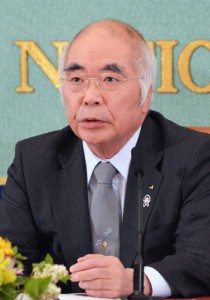Akira Banzai, head of the Central Union of Agricultural Cooperatives (JA Zenchu), stressed Friday, May 10, that the group is “dead set against” Japan’s entry into the Trans-Pacific Partnership free-trade negotiations. “The TPP could hinder national sovereignty, and we have no intention whatsoever to negotiate on conditions,” Banzai said, speaking at the Japan National Press Club.
As issues of concern related to the TPP, Banzai listed such possibilities as drastic drop in agricultural production, devastation of agricultural villages and regional cultures, disintegration of functions to protect the national land and its environment and diminution of related industries. He also cited fears for sectors other than agriculture, such as food safety and health care systems.
The committees on agriculture, forestry and fisheries of both houses of the Diet adopted resolutions calling on the government to negotiate to exempt key products from tariff elimination in the TPP talks. Banzai asked Diet members to “make decisions and act in line with the resolutions to keep the promise they have made to the Japanese people.”
In its policy proposal draft also disclosed Friday, Zenchu stated its determination to steadily work on crucial objectives such as increasing farmers’ incomes as the group’s important mission.
The following are the details of the press conference:
Q. What is your opinion on negotiations other than those for the TPP, such as the Regional Comprehensive Economic Partnership talks?
A. TPP is different from other trade agreements in that it will, in principle, eliminate tariffs on all imported goods. Meanwhile, as for RCEP, participants will negotiate taking into consideration the diverse circumstances of the participating countries’ agriculture and based on the idea that different types of agriculture should coexist.
Q. Looking at Japan’s bilateral preparatory negotiations with each of the TPP participants, do you think Japan has a strong negotiating power?
A. In the preparatory negotiations, Japan could not get any affirmation on the treatment of key products. I am very much concerned.
Q. Do you think farmers will accept tariff elimination if all the possible measures are taken to compensate them for expected losses in income?
A. Farmers’ task is to grow crops to make a living and protect the rural community. It is not their intention to make others think that all they need is compensation.
Q. Are you calling on the government to exempt key products from the TPP negotiations?
A. When we say “exemption,” it means we want key products to be exempted from tariff elimination. We are dead set against the TPP as long as it does not revise its principles of abolishing all tariffs. If the TPP accepts exceptions in eliminating tariffs, the TPP will lose its raison d’etre. We are fighting to make this come true.
Q. In the general assembly of the World Farmers Organization held in Niigata in April, the participants agreed on the common approach on international trade, which calls for the need to take into consideration interests of the agriculture sector. How do you evaluate this outcome?
A. In the assembly, farmers worldwide could get together to propose the importance of the agricultural sector. We want to make a worldwide appeal.
Q. Zenchu’s policy proposal draft is asking for all the farmlands to be covered by the “Japanese-style direct payment” system.
A. Farmlands can be utilized not only as farmlands but for multifaceted functions. It is important to support farmlands also from the viewpoint of maintaining the survival of the state.
Q. What are Zenchu’s policies for the Upper House elections in July?
A. We don’t intend to negotiate on conditions regarding the TPP issues. We are dead set against Japan’s entry in the TPP. Board members of Japan Agricultural Cooperatives’ political sector decided on JA’s political policies on Thursday, May 9. We plan to carefully examine each candidate’s opinions concerning JA’s policies before making decisions.
(May 11, 2013)


